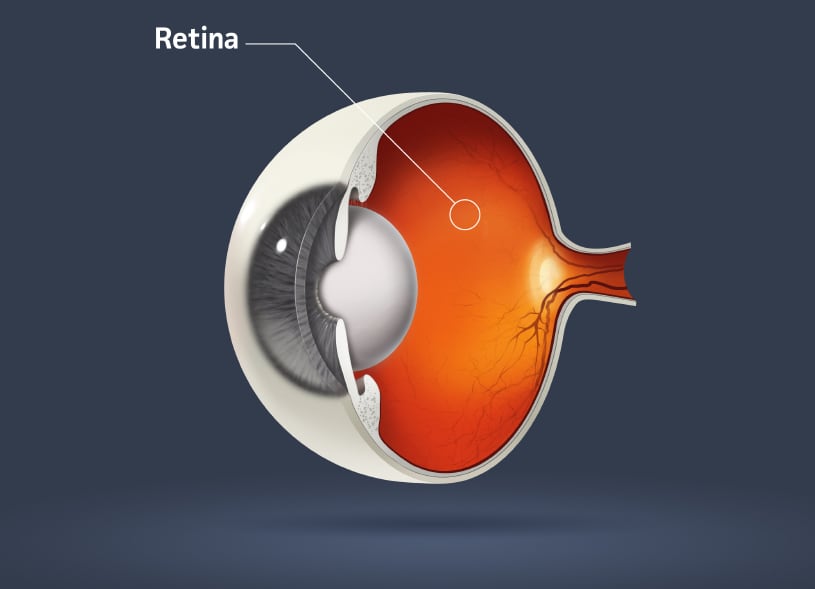The research, published in Investigative Ophthalmology & Visual Science, was conducted by the Waterford Institute of Technology and was funded by a grant from the European Research Council. Called the Central Retinal Enrichment Supplementation Trials (CREST), the goal, according to the researchers, was “to use a gold standard clinical trial design to study the ‘‘protective’’ and ‘‘visual function’’ hypotheses of MP (macular pigment).”
Importance of MP
Macular pigment is an agglomeration of yellow pigment concentrated at the macula, the region of greatest visual acuity in the retina. The pigment is composed of the three above mentioned carotenoids.
A second trial using the same three-carotenoid combination was conducted on subjects with age-related macular degeneration, the results of which will be reported in a subsequent paper. In fact many such trials looking at carotenoid supplementation in eye health have focused on this group, but the Irish researchers, who were led by Prof. John Nolan, PhD, who holds the chair of human nutrition at the Waterford Institute of Technology, thought that there was a good case to be made that these three carotenoids performed an everyday function in supporting visual performance and were not hoarded by the body merely to forestall the erosion of time.
“From an evolutionary perspective, it is unlikely that humans have evolved to selectively accumulate three carotenoids (L, Z, and MZ) in the central retina to retard the natural course of an age-related disease. In other words, it seems intuitive that the primary role of MP is other than protection against age-related macular disorders,” they wrote.
The study followed 105 subjects with an average age of about 48, split more or less evenly between men and women and divided into supplementation and placebo groups. All participants had normal vision but had lower than normal amounts of MP at the start of the trial. The study group had no history of supplementation with the carotenoids in question before the trial, and were asked to take a placebo or a capsule containing 10mg of lutein, 10mg of meso-zeaxanthin and 2 mg of zeaxanthin once a day with a meal. This regimen was followed for a year.
Boosting contrast performance
To assess the results of the intervention, the researchers measured the change in overall MP and ranked that against changes in contrast specificity, a more finely-honed measurement of visual performance than overall visual acuity, which is the more commonly-used benchmark. The researchers said using this specific parameter helped them see the results of supplementation more clearly, as visual acuity tests don’t easily measure how people’s eyes perform in different lighting conditions, such as indoor vs outdoor lighting. Contrast specificity measures how well subjects can discern the edges of things, which could for example help drivers more easily and quickly distinguish between moving and non-moving objects in their visual field. The researchers concluded that the intervention provided statistically significant improvements in both MP volume and in contrast specificity performance.
Formula considerations

Prof Nolan said that his team settled upon the 10:10:2 dosage formula (commercially available in North America as MacuHealth and in Europe as MacuShield) for a couple of reasons:
“The quick answer is that we believe that circa 20 mg of total carotenoids is required to achieve optimal response, and that meso-zeaxanthin present in the formulation offers advantages over formulations lacking in this carotenoid. In addition, the 10/10/2 formula is the only commercially available formula that has undergone extensive safety evaluation,” Nolan told NutraIngredients-USA.
Nolan said in past trials his team has looked at different dosages and found that more was not better. In the CREST trial, blood serum levels of all three carotenoids rose over time, peaking at about 6 months, and then declined gradually thereafter. The MP level showed a steady rise, however.
“It takes time for the tissue (e.g. the retina) to accumulate the carotenoids and sustained supplementation is required to achieve this. I do not think that the carotenoids are excreted, but are likely used by the tissues that accumulate them. I suggest that there is some type of auto-regulatory mechanism in place,” Nolan said.
There is some disagreement in the carotenoid supplementation community about the need for the addition of meso-zeaxanthin to the other two carotenoids. The claim is that this carotenoid is synthesized by the body from lutein. Nolan’s view is that this had not been fully proven, and the two studies that advocates of that viewpoint refer to to support their position were not conducted in humans. He is also of the view that the lutein used in these studies in fact contained some meso-zeaxanthin.
The Waterford team concluded that the positive results show that supplementation with the formula could improve the visual quality of life for the average person, helping them to more easily resolve images such as individual leaves on a tree, as well as helping them to perform better in more challenging visual situations, such as while driving. The results could also be significant for professional athletes, especially in sports like baseball or cricket, and for members of the military.
Source: Investigative Ophthalmology & Visual Science
2016, Volume 57, Number 7, Pages 3429-39. doi: 10.1167/iovs.16-19520.
“Enrichment of Macular Pigment Enhances Contrast Sensitivity in Subjects Free of Retinal Disease: Central Retinal Enrichment Supplementation Trials - Report 1”
Authors: Nolan JM et al
